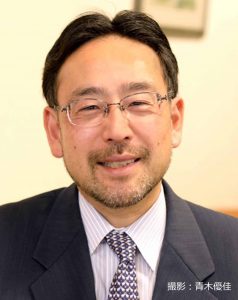- *This event now concluded.
- Lecturer: Motani Kosuke (Chief Senior Economist, Japan Research Institute, Ltd.)
- Date: Saturday, September 7, 2019, 2:00-3:15 pm (Doors open at 1:30 pm)
- Venue: Lecture Hall, International House of Japan
- Language: Only available in Japanese (without English interpretation)
- Admission: Free (reservations required)

Mr. Motani works as a regional economist combining his observations from the field with a broad-based analysis including topology, local economy, tourism, demographics, and local history. He always sees challenges in a new light, for instance, by focusing on fluctuations in the working population to examine economic growth and suggesting a subsystem called “satoyama capitalism” as a supplement to money-based capitalism to include nonmonetary assets like nature and community. While it is said that Japan has a lot of towns facing extinction because of depopulation, he notes that from a global perspective Japan has huge advantages geopolitically and culturally. Based on his wide-ranging fieldwork, he will share his ideas on a new social system and the necessary leadership for building sustainable societies.
Motani Kosuke (Chief Senior Economist, Japan Research Institute, Ltd.)
 Born in Yamaguchi, Japan, in 1964, Mr. Motani started his career at the Japan Development Bank in 1988. Before the Great Heisei Mergers, he visited all 3,200 municipalities in Japan, as well as 105 countries abroad, and gained an appreciation for the various aspects of regional character. Over the years, he has actively worked on the issues of regional development, population aging, and tourism promotion. His publications include Defure no Shotai [Non-monetary Deflation in Japan] (Kadokawa Shoten, 2010), Satoyama Shihonshugi [Satoyama Capitalism] (Kadokawa Shoten, 2013), Sekai Machikado Chiseigaku 90 kakoku Dangan Ryokoki [The Geopolitics of the World Street Corners: Travelogue of 90 Countries] (Mainichi Shimbun Publishing, 2018), Kanbon Shinayaka Nippon Retto no Tsukurikata: Motani Kosuke Taiwashu [A Complete Book of How to Make a Resilient Japan: A Collection of Conversations with Kosuke Motani] (Shincho Bunko, 2018), and Sekai Machikado Chiseigaku Next [The New Geopolitics of the World Street Corners] (Bungei Shunju, 2019). He has an MBA from Columbia University, and has held his current position since 2012.
Born in Yamaguchi, Japan, in 1964, Mr. Motani started his career at the Japan Development Bank in 1988. Before the Great Heisei Mergers, he visited all 3,200 municipalities in Japan, as well as 105 countries abroad, and gained an appreciation for the various aspects of regional character. Over the years, he has actively worked on the issues of regional development, population aging, and tourism promotion. His publications include Defure no Shotai [Non-monetary Deflation in Japan] (Kadokawa Shoten, 2010), Satoyama Shihonshugi [Satoyama Capitalism] (Kadokawa Shoten, 2013), Sekai Machikado Chiseigaku 90 kakoku Dangan Ryokoki [The Geopolitics of the World Street Corners: Travelogue of 90 Countries] (Mainichi Shimbun Publishing, 2018), Kanbon Shinayaka Nippon Retto no Tsukurikata: Motani Kosuke Taiwashu [A Complete Book of How to Make a Resilient Japan: A Collection of Conversations with Kosuke Motani] (Shincho Bunko, 2018), and Sekai Machikado Chiseigaku Next [The New Geopolitics of the World Street Corners] (Bungei Shunju, 2019). He has an MBA from Columbia University, and has held his current position since 2012.
 Born in Yamaguchi, Japan, in 1964, Mr. Motani started his career at the Japan Development Bank in 1988. Before the Great Heisei Mergers, he visited all 3,200 municipalities in Japan, as well as 105 countries abroad, and gained an appreciation for the various aspects of regional character. Over the years, he has actively worked on the issues of regional development, population aging, and tourism promotion. His publications include Defure no Shotai [Non-monetary Deflation in Japan] (Kadokawa Shoten, 2010), Satoyama Shihonshugi [Satoyama Capitalism] (Kadokawa Shoten, 2013), Sekai Machikado Chiseigaku 90 kakoku Dangan Ryokoki [The Geopolitics of the World Street Corners: Travelogue of 90 Countries] (Mainichi Shimbun Publishing, 2018), Kanbon Shinayaka Nippon Retto no Tsukurikata: Motani Kosuke Taiwashu [A Complete Book of How to Make a Resilient Japan: A Collection of Conversations with Kosuke Motani] (Shincho Bunko, 2018), and Sekai Machikado Chiseigaku Next [The New Geopolitics of the World Street Corners] (Bungei Shunju, 2019). He has an MBA from Columbia University, and has held his current position since 2012.
Born in Yamaguchi, Japan, in 1964, Mr. Motani started his career at the Japan Development Bank in 1988. Before the Great Heisei Mergers, he visited all 3,200 municipalities in Japan, as well as 105 countries abroad, and gained an appreciation for the various aspects of regional character. Over the years, he has actively worked on the issues of regional development, population aging, and tourism promotion. His publications include Defure no Shotai [Non-monetary Deflation in Japan] (Kadokawa Shoten, 2010), Satoyama Shihonshugi [Satoyama Capitalism] (Kadokawa Shoten, 2013), Sekai Machikado Chiseigaku 90 kakoku Dangan Ryokoki [The Geopolitics of the World Street Corners: Travelogue of 90 Countries] (Mainichi Shimbun Publishing, 2018), Kanbon Shinayaka Nippon Retto no Tsukurikata: Motani Kosuke Taiwashu [A Complete Book of How to Make a Resilient Japan: A Collection of Conversations with Kosuke Motani] (Shincho Bunko, 2018), and Sekai Machikado Chiseigaku Next [The New Geopolitics of the World Street Corners] (Bungei Shunju, 2019). He has an MBA from Columbia University, and has held his current position since 2012.
What is the “Nitobe Leadership Program”?
Nitobe Kokusai Juku was an educational program for young professionals from 2008 to 2018. In 2019, it was succeeded by the Nitobe Leadership Program with a new framework as the issues we are currently confronting are becoming more diverse, complex, and difficult to solve. This program invites as lectures experts in various fields who have put their transdisciplinary ideas into practice, and gives fellows opportunities to examine roles and possibilities with individuals who are enthusiastic in overcoming challenges with innovative ideas. It thereby provides fellows with a platform to “design and take action to create our own future.”